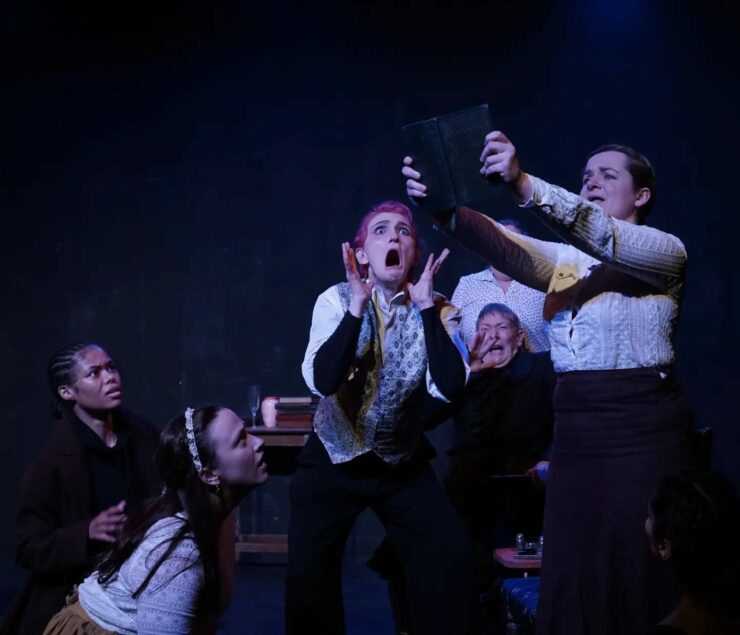A Society (For the Cutting Up of Men) is a deliciously complex and layered piece, which dances and dallies in self-satire and the death of the patriarchy. Both are quantified in equal measure – the piece is a frenetic mash-up of Virgina Woolf’s oft-discarded short story ‘A Society’ and Rachel Solanas’ infamous ‘SCUM Manifesto’, made famous when she attempted to kill pop artist Andy Warhol for withholding a Feminist script she had wanted him to direct, among other anti-patriarchy motivations. A Society offers up a refreshingly anarchistic, intelligent and sometimes academic take on calling for the end of the Patriarchy. Unfortunately, it’s unclear quite what the piece thinks about either of its source materials, and as a result ends up missing a point for the audience to connect with.
The piece is two-fold, and very much a prism to both of the works that it draws inspiration from. When I say it draws inspiration, I mean that much of both texts are performed as verbatim excerpts with comments both from the physicality of its performers and with interjections from Audre Lorde among other Feminist commentators. The first fold of the piece deals with Woolf’s story, which sees a woman named Poll be tasked with reading every book in the British Library in order to receive her father’s inheritance. Itself half-a-fable and half-a-manifesto, Poll meets with a group of women who, upon learning the contents of the wealth of the world’s books, set about on a quest to decide whether it is worth being ‘birth-givers’ any more, or if they should “stay chaste” in light of the horrid world that men have created.
This section is performed entirely in period costume, with a full 19th Century Drawing Room set cast across the stage. This setting is delightful to see, as the actors emerge on stage they jump at the opportunity to lay waste to the efforts of men pre-World War One in creating a society that produces “Good People and Good Books”. The piece, at this point, lies behind an extremely thin veneer of a Fourth Wall, in which we can see quite evidently that the actors playing Poll and the rest are itching at the opportunity to flaunt and fancy the typical image of a Woman in this period, laying the groundwork for the anarchic madness that will soon ensue. You can tell from early on we are building up to some point of tension puncture, and it is delivered with such verve and style that ‘Plot Twist’ doesn’t even feel enough to cover it.
The metaphorical stage curtain drops completely then, as the once-period clad performers emerge in full black, and one of our central narrators dons a black leather overcoat, withdrawing a pistol and laying on a full anti-man manifesto. We have switched tracks completely now to handle the Solanas piece, which is done with joy and vigour in its early stages. The performers slump into husks of the ‘visceral’ men, who are consumed purely by the self-satisfying acts of the body and the instantly-available corporeal satisfactions of Capitalism. These characterisations are hysterical, and laquer on the 21st Century with images of video games, Reddit and an armchair patriarchy. Soon we are interrupted with short interludes from Audre Lorde and other Feminist theorists, which act to provide a little bit of comment and start to steer us in the direction of ‘a point’.
And then, unfortunately, the piece simply concludes by wrapping up the Solanas material with scenes of increasingly vague imagery. There’s a lot to go back to and unpack. It’s important to note that this whole piece is dripping in self-awareness of who it is going to piss off and who it is going to invite in, and that works totally fine to that end. The show is so gale force with the Solanas material that it manages to evoke the obvious questions which Solanas herself dubiously answered, and then unanswered, about its seriousness. ‘SCUM Manifesto’ has been posited as a work of self-satire, hyperbole, drawn to mimic and parody Freud, while also having been posited as fully wittingly inciting violence, radical change and revolution. Concerning both Woolf and Solanas, this piece sets out early on that it is engaging academically with these pieces, but in the end offers up little that the audience can digest outwidth the original messages of either piece.
There are two potential audiences to this show – those who will get the references, and wonder why the directorship have chosen to do so little with those references, and then those who won’t get the references, and will take the piece fully at face value. I do believe that the piece is as riotously anti-patriarchy as its source material posits, but I also believe that show creators have more nuance to offer rather than just showing the parallels between Woolf and Solanas. There will be people pissed off by this show, and that is very much a good thing, but I think the show creators could take more time to make sure they’re pissed off by their own take on the texts, rather than a hauntologised mash-up of views from the past. There were glimpses of nuance and verve in the sections I mentioned I liked, and this energy could be teased out quite easily to great success.
A Society very much gets to the point, but is lacking in terms of offering up something cohesive as a point. The show does little to make the two texts it harnesses more accessible, but on the flip side provides an experience so catatonically engaging and stirring that you’re left completely entranced. It is a mesmerising piece of theatre, and I really wanted to fall into its arms and let it lead me to the revolutionary message it promises. Maybe that’s some of the fun, however, in these kinds of performances. Rather than spoonfeeding, we are forced to do our own homework if we want to extract something academic out of this show. Does it work? That will depend on you. But it is a dazzlingly potent and rebellious thing to be a part of for sixty minutes.
Raw, ripe and consistently unhinged in the best way, this is the anti-(man)ifesto you’ve been dreaming of. Whether it will have you convinced is very much down to what you’ve read and seen going in. Star-ratings aside, this is something to go and see with your pals if you’re ready for a hearty debate over a pint afterwards.
Recommended Drink: A Society is a Death in the Afternoon – toxically potent, with a humming anethol undercurrent and punchy champagne top.
Catch A Society (For the Cutting Up of Men) at the Network Theatre until February 5th at 20:15, 19:45 and 14:30. Tickets are available through the VAULT Festival Box Office.









